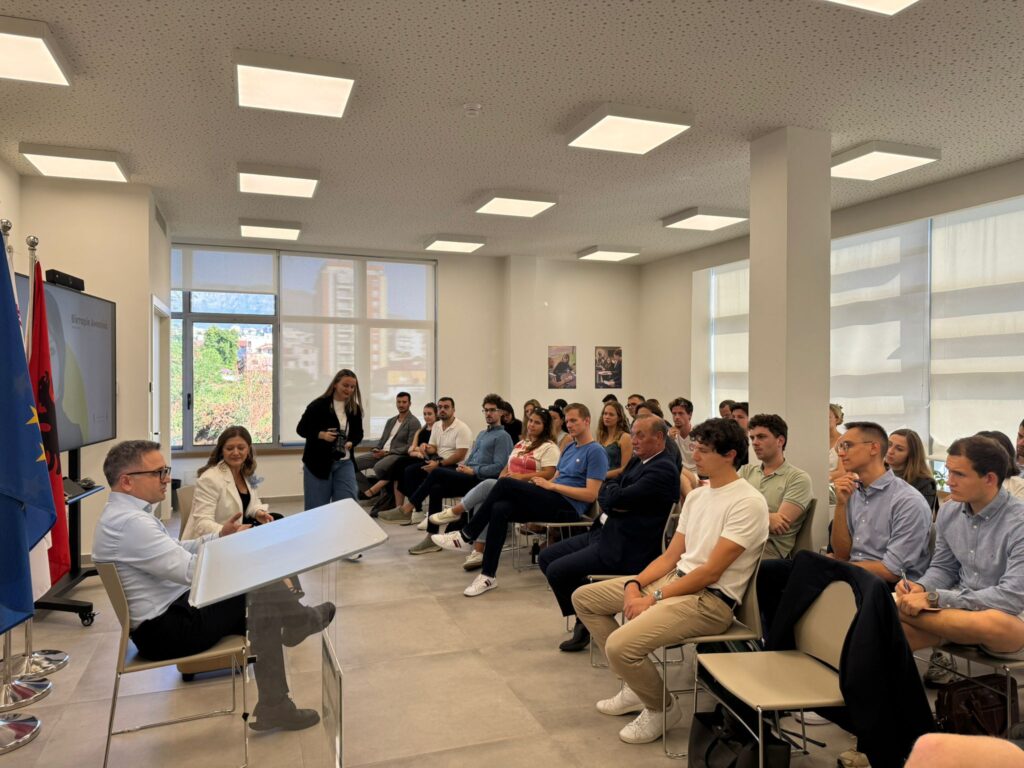Challenges of the EU Accession Process of North Macedonia and Prospects from the Growth Plan for the Western Balkans
The European integration of the Western Balkans remains one of the most important strategic projects for the stability, prosperity, and unity of Europe. North Macedonia’s journey toward EU membership is both a testament to the region’s aspirations and a reflection of the complex challenges that accompany this path. During my recent guest lecture at the College of Europe in Tirana (September 18, 2025), I had the privilege of discussing these challenges and the opportunities offered by the EU’s new Growth Plan for the Western Balkans.
The Role of the Ohrid Framework Agreement
One cannot fully understand North Macedonia’s EU path without recognizing the historic importance of the Ohrid Framework Agreement (2001). Reached in the aftermath of conflict, the OFA became the foundation of North Macedonia’s state-building in the 21st century.
The agreement:
Ensured peace and stability by ending armed conflict and fostering reconciliation among communities.
Strengthened democracy through constitutional and institutional reforms that guaranteed greater rights and representation for all citizens, particularly non-majority communities.
Paved the way for Euro-Atlantic integration, positioning North Macedonia as a credible partner for NATO and the EU.
More than just a peace deal, the OFA was a visionary compromise that transformed potential division into an inclusive framework for state-building.
A Model for the Region
The significance of the OFA extends beyond North Macedonia. It demonstrates how dialogue, compromise, and institutional innovation can resolve conflict, stabilize fragile democracies, and open a path toward integration. For the wider Western Balkans, the OFA remains a regional model of how peace agreements can evolve into roadmaps for Euro-Atlantic and European Union integration.
The Long Road of North Macedonia’s EU Accession
North Macedonia has long been at the forefront of the region’s EU path. It was the first Western Balkan country to sign a Stabilisation and Association Agreement (SAA) with the EU in 2001, and in 2005 it became the first country in the region to obtain candidate status. These milestones positioned the country as a frontrunner in enlargement.
Yet, despite this early start, progress toward membership has been marked by repeated obstacles:
- Bilateral Disputes: Disagreements over history, identity, and language have delayed the process, demonstrating how bilateral issues can overshadow collective EU enlargement goals.
- Enlargement Fatigue: Within the EU, political hesitations and enlargement fatigue have slowed decision-making, reinforcing the perception of a credibility gap.
- Institutional Reforms: While progress has been made in strengthening the rule of law, public administration, and the fight against corruption, significant reforms are still required to align fully with EU standards.
The result has been a prolonged period of uncertainty—testing public trust in the EU and creating reform fatigue at home.
The EU’s Growth Plan: A New Perspective
Against this backdrop, the EU Growth Plan for the Western Balkans provides renewed momentum. By linking tangible economic benefits with reform progress, the plan aims to bridge the “waiting room gap” of enlargement.
Key features of the Growth Plan include:
- Access to Parts of the Single Market: Allowing Western Balkan economies, including North Macedonia, to gradually participate in areas such as free movement of goods, services, and capital.
- Financial Incentives: Substantial funds to support economic transformation, conditioned on reforms in governance, the rule of law, and economic competitiveness.
- Regional Integration: Strengthening cooperation within the Western Balkans through initiatives like the Common Regional Market, thereby preparing the region collectively for EU membership.
This dual-track approach—reform and reward—creates not only motivation but also a sense of shared ownership of the integration process.
Personal Perspective: A Shared Effort
As someone who has been among the initiators of the Growth Plan, as Minister of Finance, I was honored to have hosted the first ministerial meeting on this initiative in Skopje in November 2023. That meeting marked a significant step in creating a framework where reforms are directly linked to economic opportunities, making the EU perspective more tangible for our citizens.
This experience confirmed for me that when there is genuine political will and strategic focus—both in the Western Balkans and in Brussels—progress is possible.
Prospects for North Macedonia
For North Macedonia, the Growth Plan presents both opportunities and responsibilities:
- Economic Modernization: Increased access to the single market can accelerate industrial modernization and innovation.
- Youth and Human Capital: Greater mobility opportunities can help retain young talent by giving them reasons to build their future at home while engaging with Europe.
- Political Responsibility: Political leaders must use this window of opportunity to implement reforms decisively, avoiding the temptation to postpone difficult decisions.
A Call for Shared Responsibility
The path toward EU accession is not a one-sided process. It requires both the EU and North Macedonia (along with its Western Balkan neighbors) to embrace shared responsibility.
- For the EU: to keep enlargement credible, predictable, and free from political blockages.
- For North Macedonia: to remain committed to reforms, strengthening democratic institutions, and delivering tangible results for its citizens.
The EU accession process is not merely a technical exercise—it is a societal transformation. The Growth Plan offers a framework to keep this transformation alive and meaningful while awaiting full membership.
The story of North Macedonia’s EU accession is emblematic of the wider Western Balkan experience: a region striving for a European future, often caught between high expectations and complex realities. The new Growth Plan represents a chance to re-energize this process, provided there is political will, both in Skopje and in Brussels.
Inspiration for the Future
The young generation I met at the College of Europe in Tirana inspires confidence. Their questions, ideas, and optimism show that the vision of a united Europe continues to resonate strongly. It is now up to policymakers—both in the region and in the EU—to match that aspiration with decisive action.

Fatmir BESIMI
Professor of Economics, South East European University, North Macedonia.
Founder and CEO of Strategers.

